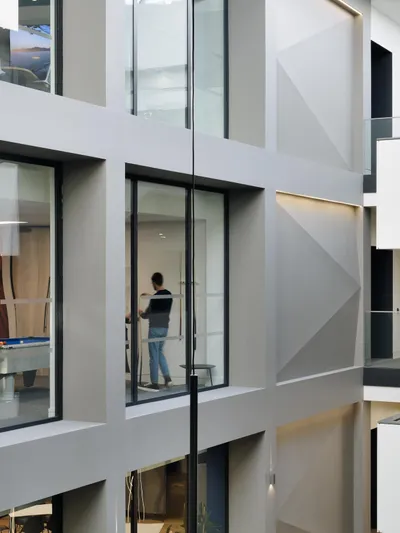Driving the Future of Work
We are committed to shaping the future of work through innovation and collaboration, leveraging cutting-edge knowledge.
Our partnership with WORKTECH Academy, the world’s leading online knowledge platform, demonstrates our commitment to workplace evolution and reflects our dedication to sustainability, employee development, and environmental responsibility.



A Global Network for the Evolution of Work
Founded in 2016, WORKTECH Academy is a prestigious global network dedicated to exploring the future of work and workplace dynamics. It offers a wealth of insights, research, case studies, and expert interviews, drawing from WORKTECH's extensive worldwide network.
Their mission has remained consistent over the years: to create a platform where companies, academics, and professionals can come together to discuss key trends and insights related to the future of work. Their focus encompasses six critical areas: People, Place, Culture, Design, Technology, and Innovation. By bridging the gap between academic research and real-world practice, WORKTECH Academy provides a global perspective on workplace transformation.


Why Our Partnership Matters
As a founding Global Partner of WORKTECH Academy, Area has played a pivotal role in shaping conversations about the future of work. Our partnership provides us access to exclusive learning and development opportunities, enabling our team to gain valuable insights and foster personal growth. This collaboration strengthens our mission to delivering exceptional services and positions us at the forefront of emerging workplace trends.
We actively contribute to and benefit from WORKTECH Academy's expansive network of industry leaders, experts, and innovators. We are part of a worldwide community of companies and professionals, all working together to shape the future.
Exploring the Dynamics of Work
Over the years, our partnership with WORKTECH Academy has allowed us to explore the evolving dynamics of the workplace. Together, we have examined the key drivers of workplace performance, focusing on how leadership, wellbeing, technology, and environment shape the modern work experience. Each year has brought new challenges and insights as we continue to adapt to the rapid changes in how and where we work. Below, we highlight some of the major research topics we've collaborated on, showcasing the diverse nature of our ongoing exploration of workplace design and performance.
2023: Building a Workplace Community
Fostering Community in a Hybrid Work Model
The shift to hybrid and remote work has brought new challenges for maintaining workplace community, a theme that dominated our 2023 research. We explored how cultural values and design can work together to foster a sense of belonging and purpose, even in distributed work environments. Through case studies of organisations with strong cultural identities, we examined how spatial and interior design can reinforce community bonds and support vibrant, engaged workplace cultures, creating spaces that inspire and connect employees across locations.
2022: The Building Blocks of Workplace Experience
Creating a Memorable Workplace Experience
In 2022, we investigated the concept of workplace experience, which has risen to the top of corporate agendas as employees seek more meaningful and engaging work environments. Our research identified the essential building blocks needed to create a compelling workplace experience – one that goes beyond functionality to attract and retain talent, build culture, and support productivity. Through workshops and interviews with global brands, we uncovered how leading organisations are reimagining the workplace to align with shifting employee expectations.
2021: The Role of Workplace Design
Design as a Catalyst for Post-Pandemic Productivity
As the workplace landscape evolved in response to COVID-19, our 2021 research explored how workplace design could drive recovery and productivity. This deep dive examined the relationship between design and operational success, proposing a new framework for aligning design decisions with organisational outcomes. The report highlighted how design can enhance employee engagement, foster collaboration, and address the emerging needs of a flexible, hybrid workforce, making it a key lever for shaping the future of work.
2020: Wellbeing
Where Next for Workplace Wellbeing
The global pandemic in 2020 dramatically reshaped workplace wellbeing, bringing new urgency to the conversation. As millions transitioned to remote work, employers faced growing expectations to safeguard their employees' physical and mental health. This research dived into the evolving definition of workplace wellbeing and its essential components, considering both pre-pandemic trends and new realities. Drawing on insights from neuroscience, ergonomics, and positive psychology, we explored how wellbeing strategies could develop to improve overall employee satisfaction and performance.
2019: Leadership & Design
Enhancing Leadership Styles Through Workplace Design
In 2019, we turned our attention to the relationship between leadership styles and workplace design. The research explored how the physical design of workplaces can support or hinder various leadership approaches and organisational cultures. By focusing on the ways leadership influences workplace dynamics, we examined how design choices can be strategically aligned with leadership objectives to foster a more productive and creative environment, ultimately contributing to a more engaged workforce.
2018: Productivity
What Enhances Workplace Performance?
In 2018, we addressed the global challenge of workplace productivity in the wake of the 2008 financial crisis. Despite a decade of efforts to boost employee performance, many organisations struggled to make meaningful improvements. Our research investigated this 'productivity puzzle' by examining global attitudes towards workplace performance and identifying key factors that could unlock higher productivity levels. The study shed light on why progress has been uneven and pointed to possible ways to achieve lasting performance improvements.


Innovating Tomorrow
Our collaboration with WORKTECH Academy continues to grow, as we provide valuable insights to their independent research. We are proud to contribute to their highly anticipated World of Work report and quarterly trend reports, offering perspectives on emerging workplace dynamics and helping organisations stay ahead. Through these contributions, we remain committed to driving innovation and thought leadership in workplace design and performance



